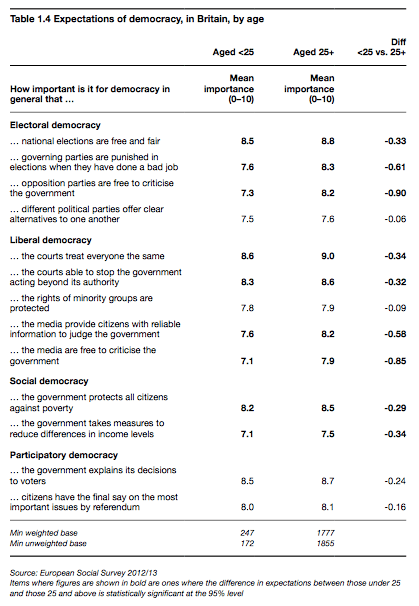“It’s at least a theory that the exposure of youngsters to overly confident ‘experts’ might explain their fondness for controversial political opinions.” Credit: Dan Kitwood / Getty

“The age of the experts is over,” says Richard Burgon, Labour’s shadow Justice secretary.
His assertion to Andrew Marr incurred much derision on social media, and since I loathe Mr Burgon’s politics, I was happy to giggle away. My favourite retort came from Patrick Wintour, the Guardian journalist:
“The age of the experts is over” declares Labour MP Richard Burgon. In Burgon’s case it never started, an expert replies. Sad that any front rank politician celebrates ignorance.
— Patrick Wintour (@patrickwintour) November 25, 2018
But I come not to bury the hapless Mr Burgon, and if I can’t bring myself to praise Burgon either, at least let me admit “I know what he was on about”. To prove my point, let’s start again.
As an expert in human genetics and functional genomics (how changes to the genome can affect the human phenotype, the observable traits of the human animal), and on the day we read claims that a Chinese researcher has successfully engineered twin girls with a disposition to be resistant to HIV, my views on gene editing are naturally of interest.
If this be true, and reproducible, we stand on the dawn of a new age of genetically-engineered health. Ethical objections to these techniques are born from ignorance, often religiously-derived ignorance, and should be tossed aside. Increased government funding should be directed towards this research as a matter of urgency.
See what I did there? All the authority for my instructions on how you should think, and act politically (overcome ethical concerns, spend more of other people’s money), is derived from the paragraph’s innocent-seeming – encouraging, even – opening five words. “As an expert in functional genomics”. My views on ethics and public spending, however, are no more nor no less important than your own. (And, for the record, I’m no expert in genetics but I do work with some clever people who are.)
Be wary, then, of any sentence which begins with “As a…”, and its intrinsic claim to authority derived from personal expertise. As a gay man, I object to homophobia and support the increased penalties for such behaviour enshrined in hate crime legislation. What does the opening subordinate clause add to the weight of the follow-on principal clause’s assertion? Nothing. It’s just an attempt to tell you – if you’re not an expert on life as a gay man – to “stay in your lane”, shut up, and nod along with my views.
Were you to disagree, now, with the whole apparatus of hate crime, you’d not only be arguing against the principle (that penalties for otherwise identical crimes should be differentiated with regard to an arbitrary aspect of the victim’s make-up), you’d be arguing against me, my very being, my grievance-mongering identity. What are you: some sort of a beast? From expertise to political shut-down: all with one glibly attractive phrase.
On this issue, then, I’m closer to Richard Burgon (and certainly, to Michael Gove) than to any Tory MP who feels the need to advertise his training as a GP on his Twitter handle.
“As a doctor and an MP, I believe we need [yadda yadda yadda]”, wrote Philip Lee, the Conservative MP for Bracknell. What Phil believes you need isn’t important (he wants you to vote again, until you agree with him about the EU, basically); what’s shocking is his (I’m sure) unthinking and reflexive call for you to obey him because he’s an “expert” (he was a GP before entering Parliament.)
Medics who become politicians are particularly prone to this “expertosis”, which I define as the pathological endpoint of the political corruption of “expertise”. It occurs when an expert conflates his or her technical knowledge about a topic with downstream political actions. There was an epidemic of expertosis, of course, during the EU referendum.
Indeed, that outbreak continues to crackle – Philip is hardly unique – with some Remain experts so certain in their assertions that predictions subject to uncertainty (about GDP, about the NHS, should Brexit take one form or another) are presented as observable facts which only irrational fools would query. The talented musician Howard Goodall is an expert on music. This allows him to assert that Brexit will “sacrifice” the “booming British music industry” on “the altar of Brexit xenophobia”.
Not one mention of music in May's WA or PD, & only a few sentences of vague uncertain waffle about mobility of talent. Our jobs-creating, revenue-earning, forward-facing, booming music industry sacrificed on the altar of Brexit xenophobia. Put it to the people.
— Howard Goodall (@Howard_Goodall) November 25, 2018
Read the responses to his claim – the slavishly devoted nature of those who want him to be correct is alarming.
This matters, beyond the psychology of those who think music, air and water will stop, should we no longer be part of the EU. There are plenty of surveys showing that the younger generation in particular has less of an attachment to democracy than one would have hoped.

It’s at least a theory that the exposure of young people to overly confident “experts” might explain their fondness for a whole set of controversial political opinions.
“If he says it, it must be true, because he’s an expert” is dangerous: just a slip from revoking the universal franchise. We’re skidding about that edge now: Dambisa Moyo argues here that voters should pass an (expert-derived) test, before being allowed to vote. Would you bet against the popularity of that proposal in Remain-voting areas?
Expertise within its locus is a human triumph: the uses to which I put my PhD in statistical inference, the work with equally skilled colleagues in many scientific disciplines (including the geneticists and genomics experts) – all this gives me more pleasure than all the joy in Mendelssohn’s violin concerto. And were you to enquire about the logic of the scientific method, I’d deploy my expertise to influence you as much as I’m able.
But political deference to “experts”, when their opinions stray from their technical discipline, leads ineluctably to restrictions on political freedom. You can trust me on that – after all, as I may have mentioned: I’m a doctor.










Join the discussion
Join like minded readers that support our journalism by becoming a paid subscriber
To join the discussion in the comments, become a paid subscriber.
Join like minded readers that support our journalism, read unlimited articles and enjoy other subscriber-only benefits.
Subscribe